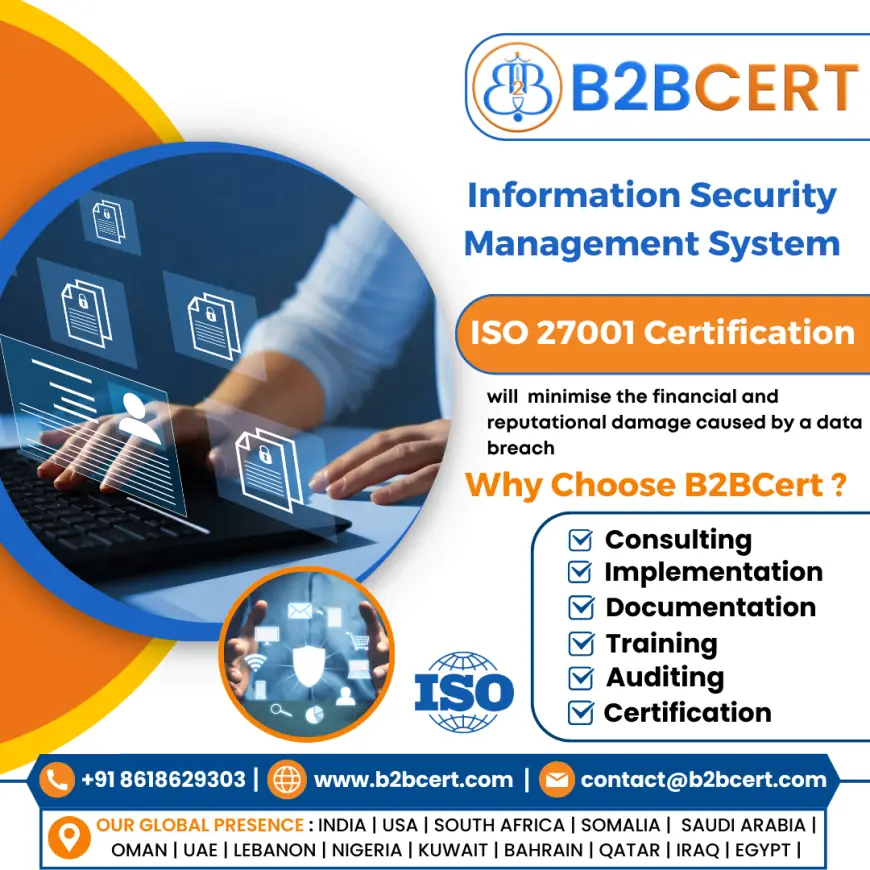ISO 27001 Certification in USA: A Strategic Move Toward Data Security and Trust
ISO 27001 Certification in the USA helps organizations establish a strong Information Security Management System (ISMS). It ensures data protection, regulatory compliance, and enhanced customer trust.

In today’s digitally driven world, information is one of the most valuable assets a business owns—and one of the most vulnerable. Cyberattacks, data breaches, ransomware, and internal threats are increasingly common, making robust information security management not just advisable, but essential. For organizations in the United States, ISO 27001 Consultants in USA has emerged as a gold standard for managing information security risks. Whether you're a tech startup in Silicon Valley, a healthcare provider in Texas, or a financial institution in New York, ISO 27001 certification provides a globally recognized framework for protecting sensitive data and demonstrating a commitment to cybersecurity and compliance.
What is ISO 27001?
ISO/IEC 27001 is an international standard for Information Security Management Systems (ISMS). Developed by the International Organization for Standardization (ISO) and the International Electrotechnical Commission (IEC), ISO 27001 outlines the requirements for establishing, implementing, maintaining, and continually improving an ISMS.
The standard provides a risk-based approach to securing information, including:
-
Identifying and managing information security risks
-
Implementing security controls and policies
-
Ensuring regulatory and contractual compliance
-
Continuous monitoring and improvement of security measures
ISO 27001 is applicable to all types of organizations—regardless of size, industry, or location—making it especially relevant in the U.S. where cybersecurity expectations are high across sectors.
Why ISO 27001 Certification Matters in the USA
The United States is home to some of the most data-intensive industries in the world—technology, healthcare, finance, education, and government. As digital transformation accelerates, businesses are not only managing more data but also facing greater scrutiny from regulators, customers, and partners.
Here’s why ISO 27001 Implementation in USA is particularly important.:
1. Protects Against Cyber Threats
With cybercrime costs projected to exceed $10 trillion globally by 2025, having a structured ISMS is vital. ISO 27001 helps prevent, detect, and respond to data breaches, ransomware attacks, insider threats, and other cyber incidents.
2. Supports Legal and Regulatory Compliance
U.S. organizations are increasingly subject to regulations like HIPAA, GLBA, SOX, and state-level data privacy laws such as California’s CCPA. ISO 27001 provides a framework that aligns with these regulations and demonstrates due diligence.
3. Enhances Customer and Partner Trust
Clients, especially in B2B industries, demand proof that their data is secure. ISO 27001 certification offers independent assurance that your organization follows best practices in information security.
4. Improves Business Resilience
The standard requires organizations to implement incident response, business continuity, and disaster recovery plans—making them more resilient in the face of crises.
5. Facilitates Global Business
Many international markets, particularly in Europe and Asia, expect vendors and partners to have ISO 27001 certification. For U.S. companies looking to expand abroad, this certification opens new doors.
Who Should Get ISO 27001 Certified?
ISO 27001 is ideal for organizations that:
-
Handle sensitive customer, employee, or partner data
-
Operate in regulated industries (healthcare, finance, defense, etc.)
-
Provide IT, SaaS, or cloud-based services
-
Manage critical infrastructure or intellectual property
-
Want to demonstrate leadership in cybersecurity
It’s especially relevant for companies that undergo frequent security assessments or respond to vendor questionnaires.
The ISO 27001 Certification Process in the USA
Here’s a step-by-step guide to achieving ISO 27001 in USA :
1. Conduct a Gap Analysis
Start by assessing your current information security practices against ISO 27001 requirements. Identify weaknesses and areas for improvement.
2. Define the Scope and Objectives
Decide what parts of your organization and what types of information will be covered by your ISMS.
3. Perform a Risk Assessment
Identify potential security threats and assess the likelihood and impact of each. Use this to define appropriate risk treatment plans.
4. Develop and Implement Controls
Implement the necessary controls outlined in Annex A of ISO 27001. These may include access controls, encryption, asset management, and security policies.
5. Employee Training and Awareness
Train all staff to understand their role in maintaining information security. A security-aware workforce is essential for long-term compliance.
6. Conduct an Internal Audit
Review your ISMS through internal audits. Address any non-conformities and document corrective actions.
7. Engage a Certification Body
Hire an accredited third-party certification body (e.g., BSI, TÜV SÜD, DNV, Intertek) to perform a two-stage audit. Upon successful completion, you'll receive your ISO 27001 certificate, valid for three years with annual surveillance audits.
Maintaining ISO 27001 Certification
Certification is not a one-time project—it requires ongoing commitment. Organizations must:
-
Continuously monitor and evaluate controls
-
Conduct annual risk assessments
-
Update documentation and policies
-
Perform regular internal audits and management reviews
-
Stay current with new security threats and technologies
By doing so, you ensure long-term security and compliance.
Final Thoughts
In the fast-paced, high-risk environment of digital business, ISO 27001 Certification Consultants in USA is a powerful tool. It’s more than just a security checkbox—it’s a comprehensive, strategic approach to protecting your organization, customers, and reputation. Whether you're a data-driven startup or a multinational enterprise, ISO 27001 helps you build trust, improve resilience, and compete in an increasingly security-conscious world.
What's Your Reaction?
 Like
0
Like
0
 Dislike
0
Dislike
0
 Love
0
Love
0
 Funny
0
Funny
0
 Angry
0
Angry
0
 Sad
0
Sad
0
 Wow
0
Wow
0
















































